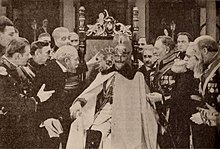The Kaiser, the Beast of Berlin
| The Kaiser, the Beast of Berlin | |
|---|---|

Still of the Kaiser in the "scrap of paper" scene
|
|
| Directed by | Rupert Julian |
| Produced by | Rupert Julian |
| Written by | Rupert Julian Elliott J. Clawson |
| Starring | Rupert Julian Elmo Lincoln Nigel De Brulier Lon Chaney Harry von Meter |
| Cinematography | Edward A. Kull |
|
Production
company |
Renowned Pictures Corporation
|
| Distributed by | Universal Jewel |
|
Release date
|
|
|
Running time
|
70 minutes |
| Country | United States |
| Language | Silent (English intertitles) |
The Kaiser, the Beast of Berlin (also known as The Beast of Berlin and The Kaiser) was a 1918 American silent war propaganda melodrama film written by, directed by, and starring Rupert Julian. The film's supporting cast included Elmo Lincoln, Nigel De Brulier, and Lon Chaney.
The germanophobic film contains a propagandist view of the First World War, showing the political greed of the German Kaiser Wilhelm II, the resistance of some of his own soldiers, and fanciful prediction of the nature of the war's end. The film is now considered lost.
Kaiser Wilhelm II of Hohenzollern (Rupert Julian) is a vain and arrogant tyrant eager for conquest. When Belgium is invaded by the German army during World War I, Marcas, the blacksmith (Elmo Lincoln), although wounded, is able to save his daughter from the clutches of a German soldier. Soon after this, the RMS Lusitania is sunk by Captain von Neigle (Nigel De Brulier), who ultimately is driven mad with remorse. After the United States declares war, the Allied generals turn the Kaiser over to Albert I of Belgium. Incarcerated, the Kaiser faces his jailer, Marcas the blacksmith.
Although frequently listed as a Universal Studios production, the film was an independent production produced by Rupert Julian for Renowned Pictures. Julian licensed the distribution rights to Renowned, who in turn sold the rights to Universal Jewel for world-wide distribution.
The Kaiser, the Beast of Berlin was an enormous hit when it was released, and Universal spared no expense in advertising the film. Universal studio head Carl Laemmle pushed the film to the theater owners as hard as he sold it to the viewing public. "A whirlwind of Applause - A Landslide of Money," "Unparalleled Receipts," and "The Picture That Blocked Traffic on Broadway" were some of the headlines for ads that ran in trade publications in an attempt to get theater owners to book the picture.
...
Wikipedia
